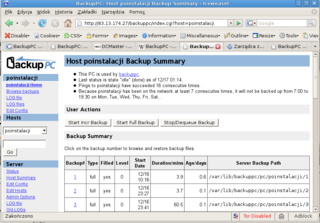The Secure Shell Protocol (SSH) is a cryptographic network protocol for operating network services securely over an unsecured network. Its most notable applications are remote login and command-line execution.
The File Transfer Protocol (FTP) is a standard communication protocol used for the transfer of computer files from a server to a client on a computer network. FTP is built on a client–server model architecture using separate control and data connections between the client and the server. FTP users may authenticate themselves with a plain-text sign-in protocol, normally in the form of a username and password, but can connect anonymously if the server is configured to allow it. For secure transmission that protects the username and password, and encrypts the content, FTP is often secured with SSL/TLS (FTPS) or replaced with SSH File Transfer Protocol (SFTP).

rsync is a utility for transferring and synchronizing files between a computer and a storage drive and across networked computers by comparing the modification times and sizes of files. It is commonly found on Unix-like operating systems and is under the GPL-3.0-or-later license.
In computing, the SSH File Transfer Protocol is a network protocol that provides file access, file transfer, and file management over any reliable data stream. It was designed by the Internet Engineering Task Force (IETF) as an extension of the Secure Shell protocol (SSH) version 2.0 to provide secure file transfer capabilities, and is seen as a replacement of File Transfer Protocol (FTP) due to superior security. The IETF Internet Draft states that, even though this protocol is described in the context of the SSH-2 protocol, it could be used in a number of different applications, such as secure file transfer over Transport Layer Security (TLS) and transfer of management information in VPN applications.
Cygwin/X is an implementation of the X Window System that runs under Microsoft Windows. It is part of the Cygwin project, and is installed using Cygwin's standard setup system. Cygwin/X is free software, licensed under the X11 License.
Secure copy protocol (SCP) is a means of securely transferring computer files between a local host and a remote host or between two remote hosts. It is based on the Secure Shell (SSH) protocol. "SCP" commonly refers to both the Secure Copy Protocol and the program itself.
Filesystem in Userspace (FUSE) is a software interface for Unix and Unix-like computer operating systems that lets non-privileged users create their own file systems without editing kernel code. This is achieved by running file system code in user space while the FUSE module provides only a bridge to the actual kernel interfaces.

WinSCP is a file manager, SSH File Transfer Protocol (SFTP), File Transfer Protocol (FTP), WebDAV, Amazon S3, and secure copy protocol (SCP) client for Microsoft Windows. The WinSCP project has released its source code on GitHub under an open source license, while the program itself is distributed as proprietary freeware.

Xming is an X11 display server for Microsoft Windows operating systems, including Windows XP and later.
Secure Shell (SSH) is a protocol allowing secure remote login to a computer on a network using public-key cryptography. SSH client programs typically run for the duration of a remote login session and are configured to look for the user's private key in a file in the user's home directory. For added security, it is common to store the private key in an encrypted form, where the encryption key is computed from a passphrase that the user has memorized. Because typing the passphrase can be tedious, many users would prefer to enter it just once per local login session. The most secure place to store the unencrypted key is in program memory, and in Unix-like operating systems, memory is normally associated with a process. A normal SSH client process cannot be used to store the unencrypted key because SSH client processes only last the duration of a remote login session. Therefore, users run a program called ssh-agent that runs beyond the duration of a local login session, stores unencrypted keys in memory, and communicates with SSH clients using a Unix domain socket.

BackupPC is a free disk-to-disk backup software suite with a web-based frontend. The cross-platform server will run on any Linux, Solaris, or UNIX-based server. No client is necessary, as the server is itself a client for several protocols that are handled by other services native to the client OS. In 2007, BackupPC was mentioned as one of the three most well known open-source backup software, even though it is one of the tools that are "so amazing, but unfortunately, if no one ever talks about them, many folks never hear of them".
Duplicity, graphical interface known as Déjà Dup, is a software suite that provides encrypted, digitally signed, versioned, local or remote backup of files requiring little of the remote server. Released under the terms of the GNU General Public License (GPL), Duplicity is free software.
Robocopy is a command-line file transfer utility for Microsoft Windows. Robocopy is functionally more comprehensive than the COPY command and XCOPY, but replaces neither. Created by Kevin Allen and first released as part of the Windows NT 4.0 Resource Kit, it has been a standard feature of Windows since Windows Vista and Windows Server 2008.
This is a comparison of notable free and open-source configuration management software, suitable for tasks like server configuration, orchestration and infrastructure as code typically performed by a system administrator.
This page is a comparison of notable remote desktop software available for various platforms.
A roaming user profile is a file synchronization concept in the Windows NT family of operating systems that allows users with a computer joined to a Windows domain to log on to any computer on the same domain and access their documents and have a consistent desktop experience, such as applications remembering toolbar positions and preferences, or the desktop appearance staying the same, while keeping all related files stored locally, to not continuously depend on a fast and reliable network connection to a file server.

OpenSSH is a suite of secure networking utilities based on the Secure Shell (SSH) protocol, which provides a secure channel over an unsecured network in a client–server architecture.
CopSSH is an implementation of OpenSSH for Windows. CopSSH offers both SSH client and server functionality and can be used for remote administration of Windows systems. CopSSH contains DLLs from the Cygwin Linux environment and a version of OpenSSH compiled from Cygwin. An administration GUI is also provided as of version 4.0.0.
Bitvise is a proprietary secure remote access software developed for Windows and available as a client and server. The software is based on the Secure Shell (SSH) protocol, which provides a secure channel over an insecure network in a client-server architecture.

Unison is a file synchronization tool for Windows and various Unix-like systems. It allows two replicas of a collection of files and directories to be stored on different hosts, modified separately, and then brought up to date by propagating the changes in each replica to the other. Syncing replicas directly Unison is independent of third-party providers.





